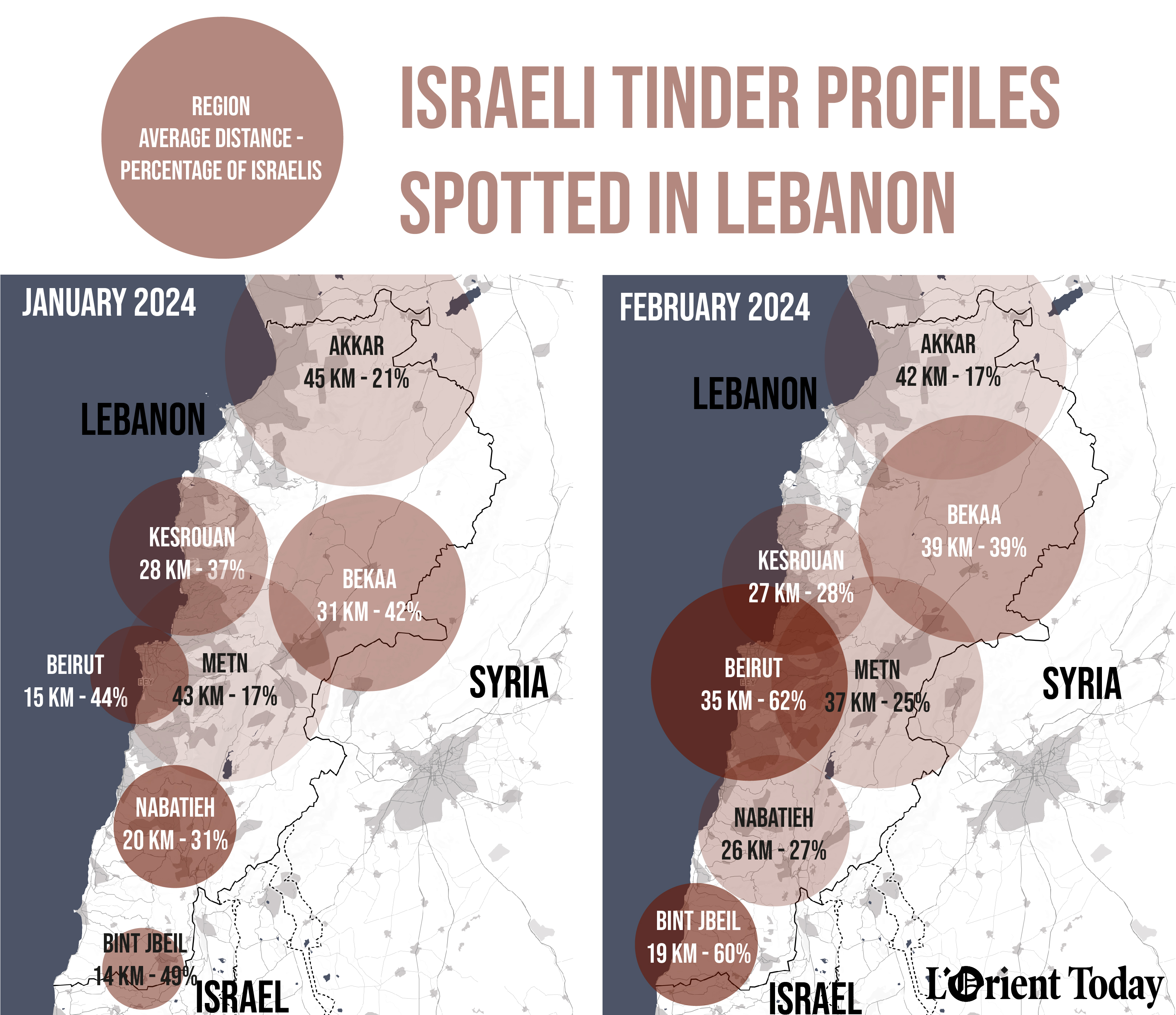
Israeli profiles on Tinder geotagged in Lebanon. (Credit: Guilhem Dorandeu)
“Only Israelis on Tinder?” Nour* couldn’t hide her surprise. Returning to Beirut in December 2023, the expat architect reactivated the popular dating app, per her holiday routine.
But this time, it was not just Lebanese profiles filling her screen. Avraham, Axel, Jacob, Yuvan – Israelis, some even donning military attire, were popping up on her phone.
Some sought a ‘short-term’ fling, others were after ‘nothing serious.’ But here’s the kicker: Many of them were located within a 10-kilometer radius of the 33-year-old, who resides in Verdun, Beirut.
"Israelis have long been visible on Tinder in Lebanon,” said Nour. “However, their recent surge in numbers and proximity is unprecedented," she added, suspecting this surge may be tied to the Gaza war and Hezbollah’s involvement from southern Lebanon.
This observation was echoed by several other Tinder users interviewed by L'Orient-Le Jour and has also been the same on other dating apps, per multiple accounts.
While users encountered various profiles depending on their location, they all pondered the same questions: Is this a GPS glitch? Or a widespread infiltration of Israeli operatives in Lebanon?
The application offers its users the Tinder Passport feature, available in the paid versions Tinder Plus, Tinder Gold and Tinder Premium, allowing them to adjust their geolocation to chat with individuals worldwide.
While the platform doesn't explicitly indicate whether a user has opted for this paid feature, it does reveal their actual location.
This dismisses the notion that individuals behind the Israeli profiles utilized Tinder Passport. Instead, it suggests they employed a relay system to mask their geolocation. When approached for comment, Tinder management did not respond to L’Orient-Le Jour’s inquiries.
In Beirut, Israelis are less than one kilometer away
In an attempt to unravel this phenomenon, L’Orient-Le Jour conducted geolocation searches via Tinder across several regions in Lebanon, aiming to monitor the frequency of Israeli profiles appearing at monthly intervals, from mid-January to mid-February.
After 100 searches per area, within a 50-kilometer radius, L’Orient-Le Jour’s findings revealed that the areas of Bint Jbeil in the south and Beirut had the highest percentage of Israeli profiles.
They accounted for 49 percent and 44 percent, respectively, in mid-January, and increased to 60 percent and 62 percent in mid-February. In contrast, Akkar and Metn displayed lower percentages, recording 21 percent and 17 percent in mid-January, and 17 percent and 25 percent in mid-February.
 Israeli profiles on Tinder spotted in Lebanon between mid-January and mid-February. Computer graphics (Credit: Guilhem Dorandeu)
Israeli profiles on Tinder spotted in Lebanon between mid-January and mid-February. Computer graphics (Credit: Guilhem Dorandeu)
The proximity of Israeli profiles in southern Lebanon may seem plausible, but it's particularly surprising in the capital, where approximately 10 Israelis have been observed less than a kilometer from the Beirut International Airport.
What implications do these figures carry? Several cybersecurity experts concurred that the extensive presence of Israeli profiles isn't tied to GPS signal interference in Lebanon, despite its prevalence in specific areas, notably in Beirut and the south, as indicated by the GPS Jam database.
GPS spoofing
"GPS jammers can disrupt or block geolocation signals, but they cannot generate false signals," said Jad Ahmad, a cybersecurity expert well-versed in thwarting digital communication threats.
According to him, this phenomenon is more likely attributable to GPS spoofing, wherein an internet user manipulates signals to appear located in a different place.
This perspective found support from another cybersecurity expert who, for security reasons, preferred to remain anonymous.
"It's evident that the individuals behind these profiles deliberately employed this technique to manipulate geolocation services," the source said.
Their motive is to potentially gather data associated with internet users in Lebanon.
According to the specialist, "this widespread presence could also be part of the psychological warfare often waged by Israel in Lebanon."
He added, "We've encountered instances where undisclosed Israelis approached Lebanese individuals on other digital platforms, notably Facebook and LinkedIn, engaging them in trust-building relationships before exploiting them to acquire sensitive data. A similar scenario could unfold on Tinder."
 Israeli profiles on Tinder geotagged in Lebanon. (Credit: Guilhem Dorandeu)
Israeli profiles on Tinder geotagged in Lebanon. (Credit: Guilhem Dorandeu)
Mohammad Najem, the executive director of the Lebanese digital rights organization SMEX, explained that the reason why this dating application — which has around 75 million active users worldwide — is popular in Israel is that it relies essentially on geolocation to propose profiles to Internet users, unlike others that rely on networks of friends and contacts saved on mobile phones.
Mossad involvement?
To experts, however, the selection of this application holds significant implications.
"Geolocation on Tinder can be leveraged by Mossad agents for intelligence purposes as it enables tracking of users' movements," said Roland Abi Najem, a cybersecurity consultant. He said that the application can be utilized to construct a "psychological profile" of individuals who divulge more personal information compared to other platforms.
While the reason behind the prominence of Israeli profiles remains unclear, and the internet users queried stated they hadn't encountered approaches from Israelis, their extensive online presence remains troubling.
This isn't the first instance of Tinder being exploited for espionage. Following the invasion of Ukraine on Feb.24, 2022, Russian operatives attempted to establish connections with Ukrainian women to gather intelligence about the situation on the ground.
Could this be the case for Israeli users in Lebanon?
*First names have been changed.
Results
Beirut (location at Beirut International Airport) :
- In mid-January: 44 percent of the profiles found were Israeli, at an average distance of 15 kilometers. Seventeen were spotted at a distance of less than 1 kilometer and five in military uniform.
- Mid-February: 62 percent Israeli, at an average distance of 35 kilometers. Sixteen were spotted at less than one kilometer, three in military uniform.
Metn (located in Broummana):
- In mid-January: 17 percent of Israelis at an average distance of 43 kilometers, including 2 in military uniform.
- Mid-February: 25 percent of Israelis at an average distance of 37 kilometers, including 10 in military uniform.
Kesrouan (located on the Wata al-Joz road):
- Mid-January: 37 percent Israelis at an average distance of 28 kilometers, including 1 in military uniform.
- Mid-February: 28 percent of Israelis at an average distance of 27 kilometers, including 15 in military uniform.
Akkar (location in Halba):
- In mid-January: 21 percent of Israelis at an average distance of 45 kilometers, including 2 in military uniform.
- Mid-February: 17 percent of Israelis at an average distance of 42 kilometers, including 7 in military uniform.
Bint Jbeil (located in Rmaish):
- In mid-January: 49 percent of Israelis at an average distance of 14 kilometers, including 6 in military uniform.
- Mid-February: 60 percent of Israelis at an average distance of 19 kilometers, including 21 in military uniform.
South (located in Nabatieh):
- In mid-January: 31 percent of Israelis at an average distance of 20 kilometers, including 3 in military uniform.
- Mid-February: 27 percent of Israelis at an average distance of 26 kilometers, including 10 in military uniform.
Bekaa (located in Baalbeck):
- In mid-January: 42 percent of Israelis at an average distance of 31 kilometers, including 3 in military uniform.
- Mid-February: 39 percent of Israelis at an average distance of 39 kilometers, including 4 in military uniform.
